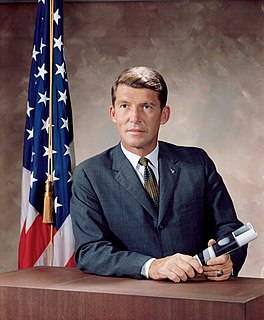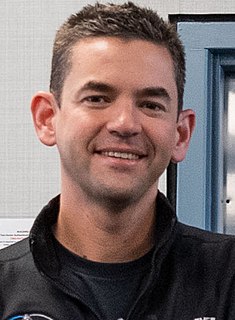A Quote by Sally Ride
Astronauts will remain the explorers, the pioneers-the first to go back to moon and on to Mars. But I think it's really important to make space space available to as many people as we can. It's going to be a while before we can launch people for less than $20 million a ticket. But that day is coming.
Related Quotes
The United States, Russia, and China are the only three countries in the world that can launch astronauts into space. Mostly in the U.S. you see some companies trying to launch private commercial people into space, but nobody's done it yet. The only private vehicle that's made it into space so far is Spaceship 1 in 2004, and that was an effort that was funded by one of the Microsoft founders, and he spent about $20 million to develop this spacecraft to do a sub-orbital flight. And it's not the same as going into orbit, but it was a huge first step.
I'd like to reiterate that the opportunities in space are going to be vastly different than they've been before, so, for young Canadians preparing for their futures, it's important to understand that there are going to be many opportunities to work in either new space industries that are being developed or to actually go to space, to be one of the people to join our team of explorers who are going to leave lower-Earth orbit. That, ultimately, is amazing, the opportunities we'll have.
To view space as, "Well, let's go to Mars now," or "Let's do this now," maybe we should rethink of space as our backyard and have a suite of launch vehicles that can enable any ambition a person has regarding space. It's the same way you can go to buy a car: I want to go offroading, I'll buy this model. I'm a city driver, that's this model. I want to use less fuel, well, that's this model. They're not selling you one car, you have options. So when I think of space, I think of having options.
People say, oh we just need charismatic leaders to continue on to Mars. Now we've gone to the moon, of course Mars is next. No. Mars was never, of course, next. It is next if you think we went to the moon because we're explorers, but if you know we went to the moon because we were at war then we're never going to Mars. There's no military reason to do it, to justify the expenditure.
In my mind, public space travel will precede efforts toward exploration -- be it returning to the moon, going to Mars, visiting asteroids, or whatever seems appropriate. We've got millions and millions of people who want to go into space, who are willing to pay. When you figure in the payload potential of customers, everything changes.
If we go back to the moon, we're guaranteed second, maybe third place because while we are spending all that money, Russia has its eye on Mars. Landing people on the moon will be terribly consuming of resources we don't have. It sounds great - 'Let's go back. This time we're going to stay.' I don't know why you would want to stay on the moon.
By 2025 we expect new spacecraft designed for long journeys to allow us to begin the first ever crewed missions beyond the Moon into deep space. So we'll start by sending astronauts to an asteroid for the first time in history. By the mid-2030s I believe we can send humans to orbit Mars and return them safely to Earth. And a landing on Mars will follow and I expect to be around in see it.
I realize that the 2020s are going to be completely different than this decade has been. There's going to be rapid progress. One of the most important aspects is going to be cheaper access to space. It changes everything. We have the ideas and the technology to do a lot of things, but we're limited financially, so, by reducing the cost of access to space, the whole problem is changed. Ultimately, the pieces that are coming together are going to allow us to send humans to Mars - and bring them back.
There are millions of people out there who would love to become astronauts, who'd love to go to space - they'd love to look back at this wonderful world from space. That will be the engine that will enable us then to develop spaceships to transport people around the world at tremendous speeds in an environmentally friendly way.
We will eventually build space science labs and hotels, prodding the capability for missions beyond the orbit of the Earth. Our space-hotel guests will be able to take breath-taking excursions, flying a couple of hundred feet above the Moon's surface in small two-man spaceships. In time, we will launch missions to Mars and beyond.
The first men who set out for Mars had better make sure they leave everything at home in apple-pie order. They won't get back to earth for more than two and a half years. The difficulties of a trip to mars are formidable. . . . What curious information will these first explorers carry back from Mars? Nobody knows-and its extremely doubtful that anyone now living will ever know. All that can be said with certainty today is this: the trip will be made, and will be made . . . someday.


























